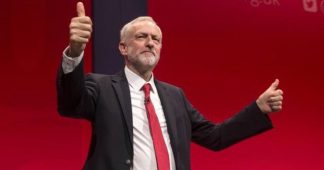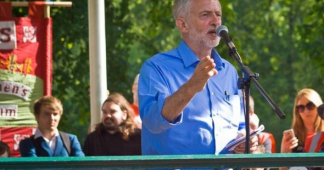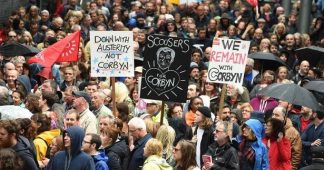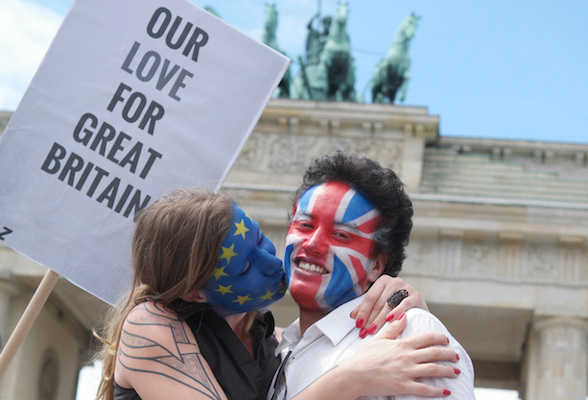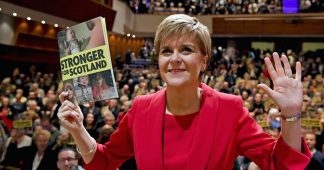By Neil Clark
02.03.2018
Jorge Ojeda-Guzman. Henri L’Estrange. Fyodor Molodstov. Just three of history’s greatest tight-rope walkers. To whose number we must now add the name of a 68-year old bearded-Briton: Jeremy Corbyn.
The UK Labour leader hasn’t tried to cross Niagara Falls, or skywalk over the River Thames. But he has attempted something you could argue is just as tricky. Namely finding a position on the extremely divisive issue of Brexit that keeps both Leavers and Remainers happy. Mission Impossible? JC might just have achieved it.
This week, in a keynote speech in Coventry, (a city close to the geographical centre of England which you could argue on Monday became its political centre too), Corbyn detailed Labour’s “evolved” policy on Brexit. He made it quite clear that Labour remains committed to Britain leaving the European Union in accordance with the wishes of the 17.4mln Britons who voted ‘Leave’ in the In-Out referendum of 23rd June 2016.
But, in a clear nod to disgruntled Remainers, Labour has now also expressed its support for not only remaining part of the EU Customs Union during the transition process, but being part of a permanent Customs Union with the EU after Britain leaves. This support for membership of a Customs Union comes with risks attached for Corbyn as inevitably it will be portrayed by his ideological opponents on the Right (and perhaps by some principled ‘Lexiteers’ too) as being a ‘betrayal’ of Leave voters.
But the more you examine it the policy — subject to the important caveats that Corbyn himself mentioned-the more it makes sense both economically and politically.
Anyone who has studied or taught Global Political Economy (GPE) will be know that for all the talk about ‘globalisation’ and ‘a shrinking world’ your most important trading partners are likely to be those nearest to you geographically. The UK’s largest trading partner is the EU. And within the EU the value of its trade is greater with the Irish Republic, the only sovereign state with which it shares a land border, than it is with Italy and Spain who are further away.Contrary to what neoliberal globalists say, regionalisation is actually getting stronger not weaker.
‘Globalisation is a tendency that has, in the majority of cases, been swamped in recent decades by a regionalising counter-tendency’ observes Colin Hay in his essay ‘Globalisation’s Impact on States’ in Ravenhill’s Global Political Economy.
It makes little economic sense therefore for Britain to reject the idea of a Customs Union with other European nations, in search of new arrangements with countries much further afield.
Politically, the Labour position makes sense too.
Whatever your views on Brexit you have to acknowledge that it would be suicidal for the party to suddenly announce that it would try to stop Britain leaving the European Union, seeing the support that Brexit has in its traditional Northern heartlands.
At the same time, the party also needs to make sure it keeps on-board the Remain voters who supported it in June 2017-and tries to accommodate the views of voters in Scotland, where the vote in 2016 went 62-38% for Remain.
Polls seem to indicate that while there has been some ‘buyers remorse’ over the Brexit vote, most people don’t think the referendum result should be reversed. Jeremy Corbyn’s nuanced position you could argue reflects this feeling perfectly.
Another factor is that by shifting its position on a Customs Union, there is an increased prospect of Labour and Tory rebels defeating Theresa May’s government in a Parliamentary vote on Brexit, which would in all likelihood trigger an early general election.
Politics is about obtaining power- and anything that brings forward that prospect has to be a good thing from an opposition party’s perspective. Corbyn would be a fool- and a pretty unambitious one at that- not to try and exploit this opportunity.
Of course, Corbyn’s compromise won’t satisfy ‘absolutists’ on both sides.
But when he uttered the words: ‘The European Union is not the root of all our problems and leaving it will not solve all our problems. Likewise, the EU is not the source of all enlightenment and leaving it does not inevitably spell doom for our country’, he probably articulated the views of the great majority.
As mentioned earlier, Corbyn’s support of Britain being a member of a post-Brexit customs union with the EU is subject to two important caveats. The first is that Britain would be ‘able to negotiate agreement of new trade deals in our national interest’. The second is that Labour would be able to ‘stop the tide of privatisation and outsourcing’ and be able to provide state-aid to industry where necessary. Of course, the EU might not accept these conditions-but at least Corbyn is laying down his position.
Jeremy Corbyn right to stress that any deals with the EU must give the UK the right to renationalise and if necessary subsidise state-owned industry. Please RT if you agree!
— CPO Public Ownership (@PublicOwnership) February 26, 2018
His vision of a Brexit that prioritises manufacturing industry, workers rights, consumer protection, environmental safeguards, and food safety standards is, it must be said, in stark contrast with that of right-wing Conservatives like Liam Fox and Dan Hannan, who see leaving the European Union as a great chance to introduce even more Thatcherite neoliberal policies — and tie the country even closer to the US, economically and politically.
Published at https://sputniknews.com/columnists/201803021062153254-jeremy-corbyn-brexit-balanicng-act/
